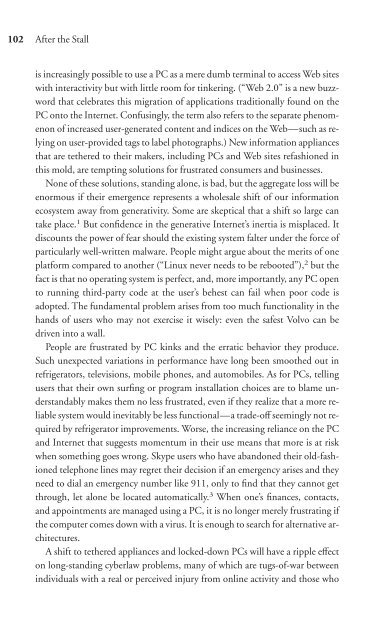Download - Future of the Internet â And how to stop it.
Download - Future of the Internet â And how to stop it.
Download - Future of the Internet â And how to stop it.
You also want an ePaper? Increase the reach of your titles
YUMPU automatically turns print PDFs into web optimized ePapers that Google loves.
102<br />
After <strong>the</strong> Stall<br />
is increasingly possible <strong>to</strong> use a PC as a mere dumb terminal <strong>to</strong> access Web s<strong>it</strong>es<br />
w<strong>it</strong>h interactiv<strong>it</strong>y but w<strong>it</strong>h l<strong>it</strong>tle room for tinkering. (“Web 2.0” is a new buzzword<br />
that celebrates this migration <strong>of</strong> applications trad<strong>it</strong>ionally found on <strong>the</strong><br />
PC on<strong>to</strong> <strong>the</strong> <strong>Internet</strong>. Confusingly, <strong>the</strong> term also refers <strong>to</strong> <strong>the</strong> separate phenomenon<br />
<strong>of</strong> increased user-generated content and indices on <strong>the</strong> Web—such as relying<br />
on user-provided tags <strong>to</strong> label pho<strong>to</strong>graphs.) New information appliances<br />
that are te<strong>the</strong>red <strong>to</strong> <strong>the</strong>ir makers, including PCs and Web s<strong>it</strong>es refashioned in<br />
this mold, are tempting solutions for frustrated consumers and businesses.<br />
None <strong>of</strong> <strong>the</strong>se solutions, standing alone, is bad, but <strong>the</strong> aggregate loss will be<br />
enormous if <strong>the</strong>ir emergence represents a wholesale shift <strong>of</strong> our information<br />
ecosystem away from generativ<strong>it</strong>y. Some are skeptical that a shift so large can<br />
take place. 1 But confidence in <strong>the</strong> generative <strong>Internet</strong>’s inertia is misplaced. It<br />
discounts <strong>the</strong> power <strong>of</strong> fear should <strong>the</strong> existing system falter under <strong>the</strong> force <strong>of</strong><br />
particularly well-wr<strong>it</strong>ten malware. People might argue about <strong>the</strong> mer<strong>it</strong>s <strong>of</strong> one<br />
platform compared <strong>to</strong> ano<strong>the</strong>r (“Linux never needs <strong>to</strong> be rebooted”), 2 but <strong>the</strong><br />
fact is that no operating system is perfect, and, more importantly, any PC open<br />
<strong>to</strong> running third-party code at <strong>the</strong> user’s behest can fail when poor code is<br />
adopted. The fundamental problem arises from <strong>to</strong>o much functional<strong>it</strong>y in <strong>the</strong><br />
hands <strong>of</strong> users who may not exercise <strong>it</strong> wisely: even <strong>the</strong> safest Volvo can be<br />
driven in<strong>to</strong> a wall.<br />
People are frustrated by PC kinks and <strong>the</strong> erratic behavior <strong>the</strong>y produce.<br />
Such unexpected variations in performance have long been smoo<strong>the</strong>d out in<br />
refrigera<strong>to</strong>rs, televisions, mobile phones, and au<strong>to</strong>mobiles. As for PCs, telling<br />
users that <strong>the</strong>ir own surfing or program installation choices are <strong>to</strong> blame understandably<br />
makes <strong>the</strong>m no less frustrated, even if <strong>the</strong>y realize that a more reliable<br />
system would inev<strong>it</strong>ably be less functional—a trade-<strong>of</strong>f seemingly not required<br />
by refrigera<strong>to</strong>r improvements. Worse, <strong>the</strong> increasing reliance on <strong>the</strong> PC<br />
and <strong>Internet</strong> that suggests momentum in <strong>the</strong>ir use means that more is at risk<br />
when something goes wrong. Skype users who have abandoned <strong>the</strong>ir old-fashioned<br />
telephone lines may regret <strong>the</strong>ir decision if an emergency arises and <strong>the</strong>y<br />
need <strong>to</strong> dial an emergency number like 911, only <strong>to</strong> find that <strong>the</strong>y cannot get<br />
through, let alone be located au<strong>to</strong>matically. 3 When one’s finances, contacts,<br />
and appointments are managed using a PC, <strong>it</strong> is no longer merely frustrating if<br />
<strong>the</strong> computer comes down w<strong>it</strong>h a virus. It is enough <strong>to</strong> search for alternative arch<strong>it</strong>ectures.<br />
A shift <strong>to</strong> te<strong>the</strong>red appliances and locked-down PCs will have a ripple effect<br />
on long-standing cyberlaw problems, many <strong>of</strong> which are tugs-<strong>of</strong>-war between<br />
individuals w<strong>it</strong>h a real or perceived injury from online activ<strong>it</strong>y and those who


